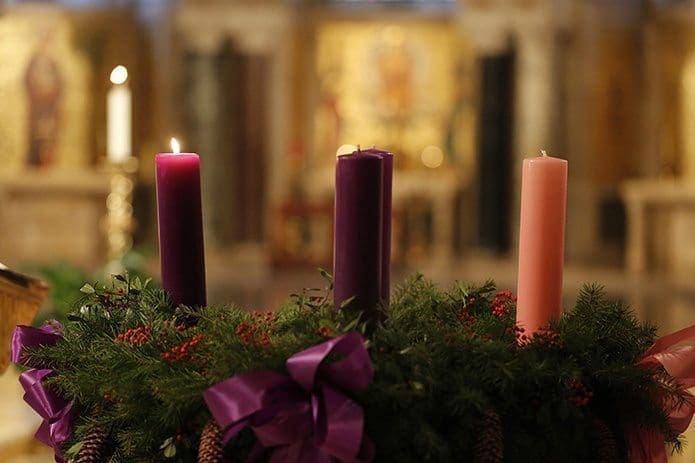 CNS photo/Bob Roller
CNS photo/Bob RollerAtlanta
Father Robert Barron: Daily Advent reflections
By FATHER ROBERT BARRON | Published November 27, 2014
ATLANTA—Advent begins Sunday, Nov. 30, as Catholics quietly prepare spiritually for Christmas and the birth of the Christ child. Included here are meditations for the first three days of Advent, written by Father Robert Barron, a noted author and speaker, of Mundelein Seminary in Illinois. These are part of a series of daily meditations made available by Father Barron free online.
Sunday, November 30
“Advent Day 1 – Our Tainted Offering”
We all know that Lent is a penitential season, a time when Christians get in touch with their sins. But Advent has a penitential dimension, too. It is the season in which we prepare for the coming of the Savior, and we don’t need a Savior unless we’re deeply convinced there is something to be saved from.
Our first reading at Mass today, from the end of the book of the prophet Isaiah, affirms this with a whole series of images describing our sinful condition.
For example, we hear this wonderful and terrible line: “All our good deeds are like polluted rags; we have all withered like leaves, and our guilt carries us away like the wind.”
When we have become deeply aware of our sin, we know that we can cling to nothing in ourselves, that everything we offer is, to some degree, tainted and impure. We can’t show our cultural, professional and personal accomplishments to God as though they are enough to save us.
But the moment we realize that fact, we move into the Advent spirit, desperately craving a Savior. We become ready for the last image from today’s reading: “Yet, O Lord, you are our father; we are the clay and you are the potter: we are all the work of your hands.”
Today, let us prepare ourselves for the potter to come.
Monday, December 1
“Advent Day 2 – The Unsatisfied Longing”
I’ve always sensed that the Advent attitudes of waiting, expecting, hoping and anticipating somehow speak to the deepest desires of our heart. That is probably because our whole existence here below is characterized precisely by these attitudes.
The world is filled with wonderful things and experiences—deep joys and satisfactions. But we all know that nothing here finally satisfies us.
No matter how much we know, we want to know more; no matter how much we love, we want greater love; no matter how much beauty we attain, we sense that there is a perfect beauty that we haven’t seen.
“O come O come, Emmanuel, and ransom captive Israel.” That great Advent hymn catches our ache. As we move into this season of anticipation, allow that ache to develop, preparing you for the satisfaction that will arrive only in Christ.
Tuesday, December 2
“Advent Day 3 – I’m Waiting, I’m Waiting”
Advent is the liturgical season of vigilance or, to put it more mundanely, of waiting. During the four weeks prior to Christmas, we light the candles of our Advent wreaths and put ourselves in the spiritual space of the Israelite people who, through many long centuries, waited for the coming of the Messiah.
In the wonderful avant-garde German movie “Run Lola Run,” a young woman finds herself in a terrible bind: she needs to gather an enormous amount of money in a ridiculously short period of time. Throughout the movie she runs and runs, desperately trying through her own frantic efforts to make things right, but nothing works. Finally, at the moment when she finds herself at the absolute limit of her powers, she slows to a trot, looks up to heaven and says, “Ich warte, ich warte” (“I’m waiting, I’m waiting”).
Though she does not explicitly address God, and though there has been no hint throughout the movie that Lola is the least bit religious, this is undoubtedly a prayer. And in the immediate wake of her edgy request a rather improbable solution to her problem presents itself.
Lola’s prayer has always reminded me of Simone Weil, that wonderful and mysterious 20th-century French mystic whose entire spirituality is predicated upon the power of waiting, or, in her language, of expectation. In prayer, Weil taught, we open our souls, expecting God to act even when the content of that expectation remains unclear.
In their curious vigilance and hoping against hope, both Lola and Simone are beautiful Advent figures.
“I’m waiting, I’m waiting,” they both exclaim. And so are we.